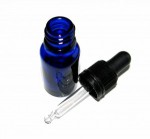This post may contain affiliate links. If you make a purchase, I may earn a commission. As an Amazon Associate, I may earn from qualifying purchases.
First published: September 14, 2013 Last updated: September 2017
Anxiety can be crippling–with many people resorting to medications in order to function in life. Unfortunately, medications can make the user emotionally numb. Many essential oils are noted for their ability to ease anxiety. As you can see from the list below, there are many options and you may already have many of these oils. Even better, there are published studies verifying that these oils can and do produce positive results.
Can essential oils help your anxiety?
It is important to make a distinction between what I will call situational anxiety vs. an anxiety disorder. It is normal to become anxious when things are stressing us out or we are facing something we don’t want to deal with. Examples include feelings of anxiety before a test, a big move, a presentation, or a medical procedure. In each case, there is a reason to be stressed and anxious. For some people though, anxiety is more severe or pervasive. Worrying about an exam weeks in advance isn’t typical. Feeling anxious to the point of not being able to function in your daily life is another sign that you may have an anxiety disorder. If your anxiety is interfering with life, or is long-lasting, you should talk to your health care provider.
When essential oils can be helpful for anxiety
Test Taking Anxiety: Whether you are a student or need to take a licensing exam, tests can make us anxious. A study of graduate nursing students found that inhaling lavender reduced anxiety in a test-taking situation. This was measured both by a drop in pulse rate and the nurse’s reports of their feelings after inhaling lavender. In fact, lavender relaxed some of them a little too much and they had some trouble staying alert enough during the test. A second part of the test had the nurses inhale rosemary. This also caused feelings of calm and a reduced pulse rate. Rosemary is noted for its ability to improve mental clarity, memory and focus. The researchers theorized that feeling more focused may have made the nurses feel more calm and prepared for the test. Lavender and Rosemary blend nicely together. If you need to relax and maintain focus, this would make a nice blend. (Source)
Medical and Dental Visits: The snap of the gloves, the sound of the drill, there are many sights and sounds that can trigger anxiety in us at the doctors or dentists. One study found that diffusing orange or lavender oil in the waiting room of a dental office helped reduce anxiety. (Source). This finding was confirmed by another study that tested for the reduction of stress using diffused orange oil in a dental setting. (Source). There are many similar studies using patients awaiting bypass surgery, dialysis, or even abortion. While many of the results show positive results, some did not find a significant difference. It is important to remember that essential oils are amazing but not wonder drugs.
Workplace Stress: In Aromatherapy 2nd ed. (affiliate link, Amazon)Keville and Green describe how researchers from the International Flavors and Fragrance association used oil blends to reduce workplace stress. The participants had lowered blood pressure and felt less tension and anxiety after inhaling the oils. The oils used were a blend of neroli, valerian and nutmeg, as well as a second blend using constituents of nutmeg and elemi oils.
Other natural ways of dealing with anxiety:
While diffusing essential oils can help both feelings of anxiety and the physical signs of it (e.g. rapid pulse and breathing) other natural methods should also be explored. Avoid stimulants like caffeinated drinks when you are anxious. Herbal teas like chamomile and lemon balm make a nice substitute and can be very calming. Breathing exercises, meditation and yoga can also help you distract focus away from stressors. All three use the breath to slow down heart and respiratory rate which promotes a sense of calm.
What oils should I use?
Many oils can help reduce stress and anxiety, but one that stands out is bergamot. The American Academy of Healthcare Sciences quotes a few studies demonstrating bergamot’s effectiveness. They report on tests conducted on stressed out elementary school teachers as well as hospice patients. Both groups responded positively to bergamot. The teachers had improvement with just 10 minutes of inhalation per week. (Source)
Of course we can’t talk about calm without mentioning lavender. One interesting study found that dental patients experienced less anxiety in the moment when inhaling lavender. What was interesting is lavender had no effect on anxiety about upcoming appointments.
How to use essential oils for anxiety?
If you are feeling anxious, the research demonstrates that using essential oils at the time you are feeling anxious seems to be most effective. At home, running a diffuser with calming blends can be a great way to use oils. When you are out and about, other options are better.
In a previous article I discussed the ethics of diffusing in a medical/dental office and that really applies to all public spaces. If you are at work, school, or at a medical appointment, a personal inhaler is my top choice. The scent is confined to you and you can put the cap back on when you are done. Diffuser jewelry would be the next best choice. Even though people in your immediate surroundings may smell it, passive diffusion releases very low levels of oil into the surrounding air.
Some blends to try:
Whether you use a diffuser or an inhaler, here are some blends to get you started. When you are ready to get adventurous, the chart below has the top oils for anxiety divided into top, middle and base notes for your blending convenience. The bolded oils are the most often cited by aromatherapy references.
3 drops Mandarin, 1 drop Ylang Ylang, 1 drop Patchouli
2 drop Lavender, 2 drops Sweet Orange, 1 Drop Roman Chamomile
3 Drops Bergamot, 1 drop Clary Sage, 1 drop Ylang ylang
2 drops Bergamot, 2 drop Neroli, 2 drops Sandalwood
2 drops Lavender, 2 drops Clary Sage, 1 drop Frankincense
Share this information with your friends:



